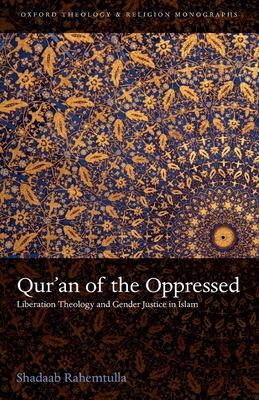Qur'an of the Oppressed: Liberation Theology and Gender Justice in Islam

Qur'an of the Oppressed: Liberation Theology and Gender Justice in Islam
This study analyzes the commentaries of four Muslim intellectuals who have turned to scripture as a liberating text to confront an array of problems, from patriarchy, racism, and empire to poverty and interreligious communal violence. Shadaab Rahemtulla considers the exegeses of the South African Farid Esack (b. 1956), the Indian Asghar Ali Engineer (1939-2013), the African American Amina Wadud (b. 1952), and the Pakistani American Asma Barlas (b. 1950). Rahemtulla examines how these intellectuals have been able to expound this seventh-century Arabian text in a socially liberating way, addressing their own lived realities of oppression, and thus contexts that are worlds removed from that of the text's immediate audience. Through a close reading of their works, he underlines the importance of both the ethico-social content of the Qur'an and their usage of new and innovative reading practices. This work provides a rich analysis of the thought-ways of specific Muslim intellectuals, thereby substantiating a broadly framed school of thought. Rahemtulla draws out their specific and general importance without displaying an uncritical sympathy. He sheds light on the impact of modern exegetical commentary which is more self-consciously concerned with historical context and present realities. In a mutually reinforcing way, this work thus illuminates both the role of agency and hermeneutical approaches in modern Islamic thought.
PRP: 500.65 Lei
Acesta este Prețul Recomandat de Producător. Prețul de vânzare al produsului este afișat mai jos.
450.58Lei
450.58Lei
500.65 LeiLivrare in 2-4 saptamani
Descrierea produsului
This study analyzes the commentaries of four Muslim intellectuals who have turned to scripture as a liberating text to confront an array of problems, from patriarchy, racism, and empire to poverty and interreligious communal violence. Shadaab Rahemtulla considers the exegeses of the South African Farid Esack (b. 1956), the Indian Asghar Ali Engineer (1939-2013), the African American Amina Wadud (b. 1952), and the Pakistani American Asma Barlas (b. 1950). Rahemtulla examines how these intellectuals have been able to expound this seventh-century Arabian text in a socially liberating way, addressing their own lived realities of oppression, and thus contexts that are worlds removed from that of the text's immediate audience. Through a close reading of their works, he underlines the importance of both the ethico-social content of the Qur'an and their usage of new and innovative reading practices. This work provides a rich analysis of the thought-ways of specific Muslim intellectuals, thereby substantiating a broadly framed school of thought. Rahemtulla draws out their specific and general importance without displaying an uncritical sympathy. He sheds light on the impact of modern exegetical commentary which is more self-consciously concerned with historical context and present realities. In a mutually reinforcing way, this work thus illuminates both the role of agency and hermeneutical approaches in modern Islamic thought.
Detaliile produsului









